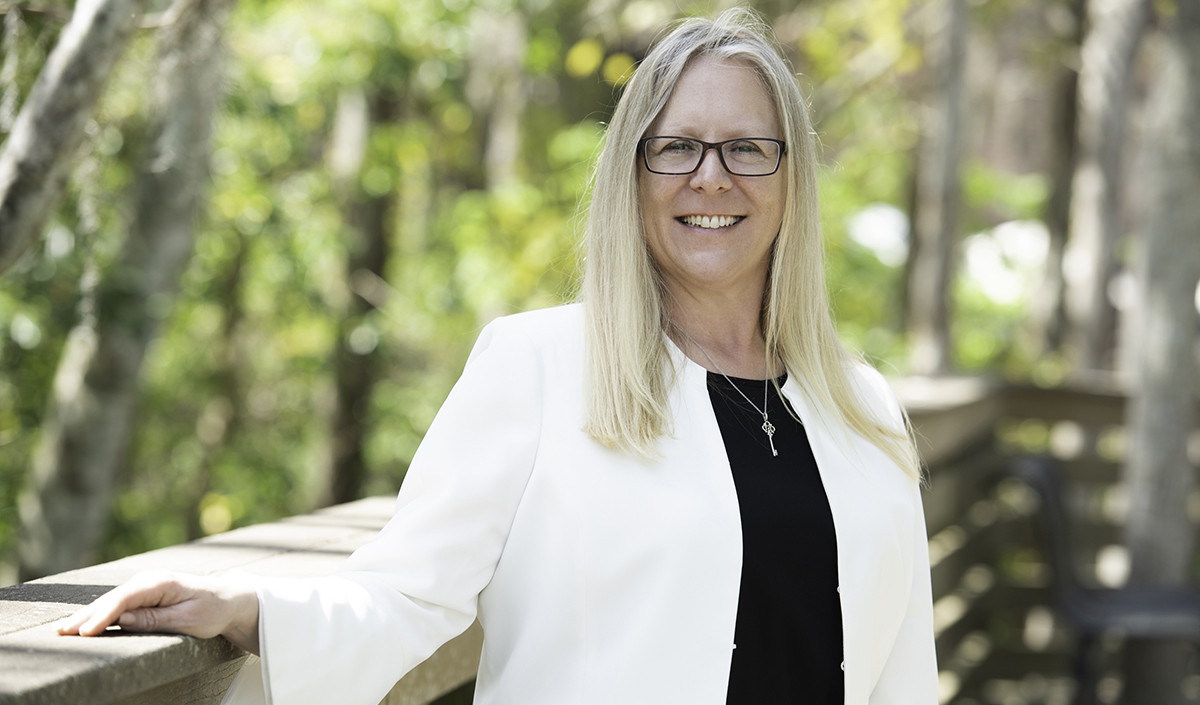UCF criminal justice professor’s record of research, teaching and service pushes boundaries of disciplinary knowledge.

Catherine Kaukinen, professor of criminal justice, recently received two career awards from the American Society of Criminology, including the Division of Victimology’s Bonnie S. Fisher Victimology Career Award and the Division on Women and Crime’s Distinguished Scholar Award. (Photo by Amy Floyd)
According to the Department of Justice in 2014, four out of five women in college who were victims of sexual violence never reported the assault to law enforcement.
Catherine Kaukinen, professor of criminal justice, says one of the most memorable moments of her career was seeing the increased number of college students who came forward to disclose victimization, as a result of the programs she developed and campus services she coordinated in violence prevention, outreach and awareness on five college campuses. Her work impacted over 35,000 students and programs remain in place today.
For more than two decades, she contributed to research related to violence against women, including around areas of study that explore intimate partner violence, risk and protective factors for violent victimization, the history of Title IX and federal initiatives to address violence against college women, and the evaluation of campus-based prevention and intervention programs.
Beyond her own research and service record in the field, Kaukinen provides mentorship for students and young faculty members, facilitating contributions of the next generation of scholars.
According to Megan Mitchell, who is an assistant professor at UCF, “She seeks to lift up and support her junior colleagues. As a new scholar, her mentorship provided a how-to guide for navigating my first years as an assistant professor.”
When you bring together people who have different pictures of a phenomenon, you're able to develop a more holistic prevention effort.
Catherine Kaukinen, Professor of Criminal Justice
Her record of research, teaching and service also pushes the boundaries of disciplinary knowledge. Her work on violence against women includes collaborations with scholars in criminology, psychology, sociology, economics, victim service care and medicine.
“When you bring together people who have different pictures of a phenomenon, you're able to develop a more holistic prevention effort,” says Kaukinen.
She also established the multidisciplinary UCF Violence Against Women faculty cluster, where she is the co-lead and works with faculty members from across the university in a number of disciplines. They examine this critical work through health, social welfare and social justice perspectives to better understand and provide insight into preventing violence against women.
According to Kaukinen, “A public health scholar may focus more on the societal level of violence against women, whereas a sociology scholar may look at the individual and culture. A nursing scholar might be more specific to an individual, like how to help a victim in the emergency room or during a visit to a primary care physician. Rather than individual snapshots where we never quite see the full picture of each other’s scholarship, a team science approach works across disciplines and boundaries. It creates a photo album where we really begin to address the problem of violence against women.”
Recently, Kaukinen received two career awards from the American Society of Criminology, including the Division of Victimology’s Bonnie S. Fisher Victimology Career Award and the Division on Women and Crime’s Distinguished Scholar Award. Not surprising with her career-long impact in the field, multiple colleagues nominated her for the awards, including Bethany Backes.
Backes, who is an assistant professor of criminal justice and social work, says Kaukinen creates connections to better understand and provide insight into preventing violence against women.
“Dr. Kaukinen excels at bridging the research-to-practice gap. She cultivates partnerships within communities and ensures her scholarship reaches practitioners to benefit the field.”